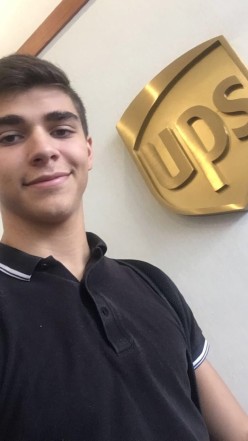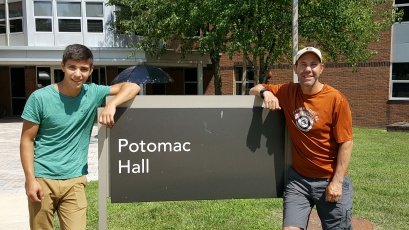What Brown Can Do for Me
What can Brown do for me?
Brown can hire my son and give him real-world, corporate, big-business experience in his chosen field in college; offer him a sturdy rung on the base of the career ladder; teach him about the discipline, responsibility, accountability, integrity, honesty,  teamwork and communications that comprise effective work environments; play a role in his maturation; and help him build a financial nest egg before launch into the adult world, all while he is still a teenager. That’s what Brown can do for me – and my 19-year-old son Daniel.
teamwork and communications that comprise effective work environments; play a role in his maturation; and help him build a financial nest egg before launch into the adult world, all while he is still a teenager. That’s what Brown can do for me – and my 19-year-old son Daniel.
After years of watching United Parcel Service’s (UPS) television ads asking, “What can Brown do for you?” and seeing the brown vans with the brown-clad delivery personnel rolling through my neighborhood, I never expected that the world’s largest package delivery company and provider of supply chain management solutions would be hiring my son as a college freshman to assist with its information technology and data management operations.
For some time as a high school senior, Daniel seemed indifferent about work. But he made a 180-degree turn in his attitude, initiative and motivation, without undue parental pressure or requirements.
He started during his senior year in high school as a restaurant worker, preparing food and grilling in the kitchen and helping customers behind the service counter. To my surprise, he chose to maintain his job after enrolling as a freshman at the University of Maryland-Baltimore County (UMBC), even though his employer was 30 minutes away from campus. He kept that job for nearly his entire freshman year.
In his freshman spring semester, Daniel, a computer science major, attended a job fair on campus, connecting with UPS, which hired him as an intern. Among the benefits of an internship at UPS are that the position is paid, and it lasts more than a semester, or even a year. UPS’s internship can last throughout a college career, as the company uses its internship program as a recruitment tool for grooming future full-time employees.
Of course, since Daniel is a computer science major taking a full load of computer systems, math, informatics and science courses, and I am a liberal arts major who has worked in journalism, public relations and the social sciences, I have a hard time understanding what he is doing day-to-day.
But this is what I got from his description: Daniel works in the world of Big Data, which Wikipedia describes as “data sets that are so large and complex that traditional data processing application software is inadequate,” and includes challenges such as capturing data, data storage, data analysis, search, sharing, and other functions. As someone who is perplexed by Small Data, I am quite impressed.
As Daniel describes it, he is an application developer who deals in the areas of customer engagement and quality control. He tracks and monitors UPS data centers and deals with code that helps keep track of data. He helps ensure that UPS’s delivery technology is working for its customers. He is a trouble-shooter.
As a father, I am proud and gratified to see my son holding down a professional job, working as a colleague with adults, becoming more independent, developing a work ethic, learning the value of earning a living and of saving for the future, investing in himself, juggling work and school, and evaluating through experience what he would like to do with his career before he is tossed into “the real world.”
Many young adults wind up directionless in their 20s, and squander precious time trying, sometimes unsuccessfully, to identify interests and passions, and how those can translate to making a living, or in working in dead-end jobs in which they have little interest or future. I know a few fathers whose sons have dealt with these challenges, and both the fathers and sons have had difficult times as a result, both as individuals and in their relationships.
So what can Brown do for me? Quite simply, it is helping my son get a good start on his adult life, which brings me peace of mind. And that’s invaluable for a parent.

 himself from the masses who hold college degrees, which no longer guarantee entry into the professional world, by going the STEM (Science, Technology, Engineering, Math) route and will find himself in demand in the job market. No post-college Parental Unit Domicile (PUD) basement-dwelling likely or necessary for him!
himself from the masses who hold college degrees, which no longer guarantee entry into the professional world, by going the STEM (Science, Technology, Engineering, Math) route and will find himself in demand in the job market. No post-college Parental Unit Domicile (PUD) basement-dwelling likely or necessary for him!